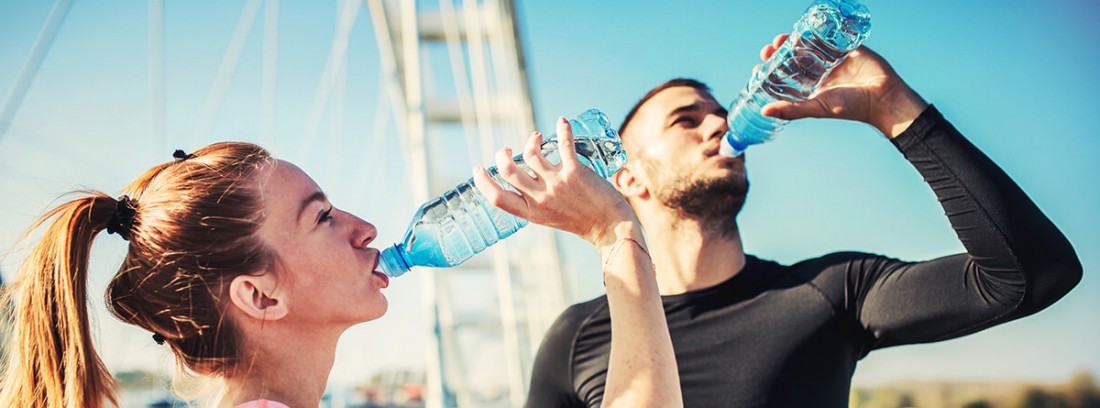Hydration in sport: Isotonic drinks

During a marathon, dehydration is progressive, but it can be responsible for a 1-3% loss of body weight. It generates consequences not only at the level of decreased performance, but it can reduce the obtaining of energy by the muscle or increase the levels of lactic acid and the risk of suffering hypoglycemia or an injury.
Therefore, it is vitally important to educate the runner about following and practicing some hydration guidelines correct both daily and in training and in the same marathon.
However, some athletes do not follow these guidelines or base their hydration plan on their sensation of thirst. This is a serious mistake because feeling this sensation is indicative that a certain level of. In addition, in sports in which a lot of fluid is lost, the feeling of thirst disappears. Therefore, thirst is never a reliable indicator of the body's fluid needs and you should never wait to feel it to start rehydration.
Remember that members have a free team of nutrition experts. A personal trainer will be able to advise you personally via chat and you will avoid risks, injuries or ailments that can be easily prevented with precise attention.
What do we call a sports drink?
The composition of a sports drink should have the following benefits:
NUTRIENTSVALUES (min / max)Energy (Kcal / L) 80-350 Kcal 75% of the Kcal must come from HC with a high Glycemic index (glucose, sucrose, maltrodextrins). Carbohydrates (gr / L) 60-90gr Concentration 6-9% Sodium (mg / L ) 460-11501 gr 230-690 mg * According to FEMEDE * According to American College of Sports Medicine Osmolality200-330 mOsm / Kr of water
Its usefulness is based on:
- Contribute to maintain glycogen stores.
- Replace electrolytes, especially sodium.
- Facilitate the rapid absorption of water thanks to its composition.
Isotonic drinks
The drinks that best fit this description are usually the isotonic, liquids prepared with aconcentration of compounds in solution very similar to that of blood, so that the body recognizes it, facilitating its rapid absorption and rapid entry into the blood. This improves the hydration of the body, as well as the digestive function.
Composition of isotonic drinks
Not all isotonic drinks have the same amounts of these components, therefore, it is essential to pay attention to the labeling:
- Water
- Fast absorbing carbohydrates
- Minerals (electrolytes)
If the amount of sugars and mineral salts is too high, it can delay the emptying of the stomach and slows down the expected effect (it takes longer to reach the intestines and, therefore, to filter into the blood). In the opposite case (when the concentration of solutes is very high) it can cause just the opposite effect to that expected: dehydration. What happens in these cases is that the intestine drags the water to dissolve the solutes, leading to the aforementioned dehydration, but also to an incorrect absorption of sugars and minerals, as well as a possible osmotic diarrhea.
When is it recommended to drink isotonic drinks?
The intake of these drinks is recommendedfor competitive athletes, as well as for the people who carry out prolonged workouts lasting more than one hour and for those who practice intense activities. It is also recommended during strong workouts and long-lasting with unfavorable weather conditions. What should be taken into account?
- The hydration must be adequate throughout the day (before, during and after exercise).
- The carbohydrates they usually come from a mixture of glucose, sucrose, maltodextrins, and fructose. Take into account your own individual tolerance to a high concentration of fructose, as it can cause gastrointestinal upset.
- The fluid to carbohydrate ratio It may vary depending on the environment, the athlete's preparation, and the demands of the exercise. If fluid needs are greater than carbohydrates, more diluted drinks can be used. Otherwise, with a higher demand for carbohydrates, you can add other supplements such as or and intersperse them in several doses.
- Athletes tend to better tolerate flavored drinks and cold fluids
Homemade isotonic drink
In the market we find endless proposals capable of covering the aforementioned considerations. Also, isotonic drinks are not difficult to prepare. and they have no mystery, the only thing you should have in the kitchen is sugar and baking sodaThis mixed with water makes a base isotonic drink, then you can add lemon or orange juice for flavor.
Ingredients for 1 liter:
- 1 liter of water.
- 1/2 tablespoon of salt, to replace sodium.
- 1/2 tablespoon of baking soda.
- The juice of 2 lemons or orange or grapefruit (or other blended fruits that you like), to improve the flavor and provide more electrolytes.
- 4 tablespoons of panela sugar or honey, for its contribution of glucose and fructose, which help as an energy supply or replace glycogen reserves. Use the appropriate concentration (6-9%) depending on the duration of the exercise.
Drink water during exercise
Water is an essential element for life and its balance is essential in the world of sport. Its functions can be included in:
- It is the medium in which all metabolic reactions take place.
- Cellular main component.
- It maintains the structure and bathes the joints.
- Maintenance of the water and electrolyte balance (osmolarity).
- Composition of blood.
- Corporal temperature regulation.
All these functions are of special interest for optimal sports performance and hence we could consider it as the most basic substance for our functioning, since large losses of this or its continued deprivation for over six, seven days are incompatible for our survival.
Alessandra huerta Nutritionist Specialist in Sports Nutrition
(Updated at Apr 13 / 2024)